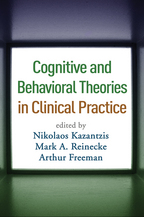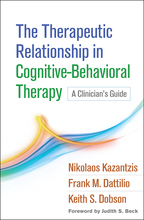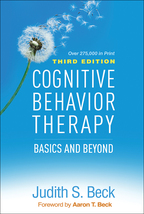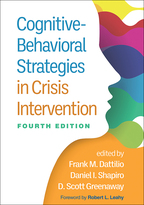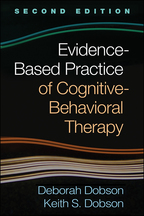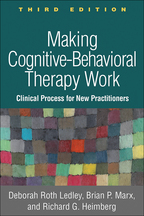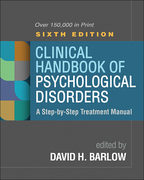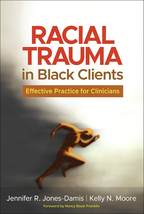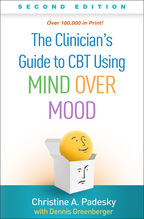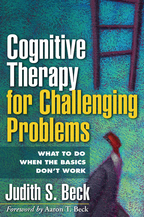Cognitive and Behavioral Theories in Clinical Practice
Edited by Nikolaos Kazantzis, Mark A. Reinecke, and Arthur Freeman
Foreword by Frank M. Dattilio
Hardcovere-bookprint + e-book
Hardcover
orderOctober 16, 2009
ISBN 9781606233429
Price: $64.00380 Pages
Size: 6" x 9"
“This book will enable therapists and students to grasp contemporary cognitive and behavioural approaches, and understand the similarities and differences between approaches. It would be invaluable to clinical nurse specialists.”

—Nursing Standard
“The book provides an excellent overview of CBT interventions and demonstrates that CBT is a rich and wide-ranging set of therapeutic interventions. Moreover, it provides for the clinician in a practical and clinical context with which the theoretical and therapeutic potentially come together.”

—Journal of Behavioural and Cognitive Psychotherapy
“This book is focused on understanding, planning, and conducting CBT, and written with insight into what theoretical knowledge is useful for psychologists doing these everyday clinical tasks. Several of the chapter authors will be familiar to clinicians as they have had a pivotal role in the ongoing development of the therapy they are writing about. In addition to being well versed in theory, it is also important to acknowledge that the authors themselves are practicing clinicians....A tool that will support 'knowledgeable, flexible, and creative work' by practitioners. This book will sit nicely alongside clinicians' handy 'how to' therapy resources, encouraging them to remember 'why' they are using a particular CBT approach. For psychologists whose continuing professional development goals include consolidating or updating on cognitive and behavioural theories this book is definitely a resource to consider.”

—Psychology Aotearoa
“The special strength of this volume is the multiple case illustrations that show how each particular theory informs clinical decision making and techniques used in the therapy.”

—Bulletin of the Menninger Clinic
“This powerful and thought-provoking book will provide exciting reading for any therapist who wants to better understand how theoretical constructs can guide and enrich clinical practice. By bringing together clear and compelling accounts of the major forms of cognitive and behavioral therapies, the editors give us a wonderful opportunity to make side-by-side comparisons of different but related approaches. This is an 'A-list' book that should be in every cognitive-behavioral therapist’s library.”

—Jesse H. Wright, MD, PhD, Professor and Kolb Endowed Chair of Outpatient Psychiatry and Director, Depression Center, University of Louisville
“This excellent volume brings together leading experts to discuss how cognitive-behavioral theories are applied in real-life clinical settings, and why they work. Including discussions of cutting-edge approaches, this is 'must' reading for practicing clinicians and graduate students.”

—Robert L. Leahy, PhD, Department of Psychiatry, Weill Cornell Medical College, New York Presbyterian Hospital
“This book's well-written chapters reflect the rich tapestry of approaches, views, lively controversies, and major issues in CBT today. One key way that the volume differs from others is its emphasis on understanding the different contemporary CBT approaches 'from the ground up' by elucidating their underlying philosophies and assumptions. The book is likely to attract a wide audience from practitioners, instructors in graduate and medical schools, and all those who want to become more broadly acquainted with the intellectual bases and current status of CBT.”

—John H. Riskind, PhD, Department of Psychology, George Mason University
—Nursing Standard
“The book provides an excellent overview of CBT interventions and demonstrates that CBT is a rich and wide-ranging set of therapeutic interventions. Moreover, it provides for the clinician in a practical and clinical context with which the theoretical and therapeutic potentially come together.”
—Journal of Behavioural and Cognitive Psychotherapy
“This book is focused on understanding, planning, and conducting CBT, and written with insight into what theoretical knowledge is useful for psychologists doing these everyday clinical tasks. Several of the chapter authors will be familiar to clinicians as they have had a pivotal role in the ongoing development of the therapy they are writing about. In addition to being well versed in theory, it is also important to acknowledge that the authors themselves are practicing clinicians....A tool that will support 'knowledgeable, flexible, and creative work' by practitioners. This book will sit nicely alongside clinicians' handy 'how to' therapy resources, encouraging them to remember 'why' they are using a particular CBT approach. For psychologists whose continuing professional development goals include consolidating or updating on cognitive and behavioural theories this book is definitely a resource to consider.”
—Psychology Aotearoa
“The special strength of this volume is the multiple case illustrations that show how each particular theory informs clinical decision making and techniques used in the therapy.”
—Bulletin of the Menninger Clinic
“This powerful and thought-provoking book will provide exciting reading for any therapist who wants to better understand how theoretical constructs can guide and enrich clinical practice. By bringing together clear and compelling accounts of the major forms of cognitive and behavioral therapies, the editors give us a wonderful opportunity to make side-by-side comparisons of different but related approaches. This is an 'A-list' book that should be in every cognitive-behavioral therapist’s library.”
—Jesse H. Wright, MD, PhD, Professor and Kolb Endowed Chair of Outpatient Psychiatry and Director, Depression Center, University of Louisville
“This excellent volume brings together leading experts to discuss how cognitive-behavioral theories are applied in real-life clinical settings, and why they work. Including discussions of cutting-edge approaches, this is 'must' reading for practicing clinicians and graduate students.”
—Robert L. Leahy, PhD, Department of Psychiatry, Weill Cornell Medical College, New York Presbyterian Hospital
“This book's well-written chapters reflect the rich tapestry of approaches, views, lively controversies, and major issues in CBT today. One key way that the volume differs from others is its emphasis on understanding the different contemporary CBT approaches 'from the ground up' by elucidating their underlying philosophies and assumptions. The book is likely to attract a wide audience from practitioners, instructors in graduate and medical schools, and all those who want to become more broadly acquainted with the intellectual bases and current status of CBT.”
—John H. Riskind, PhD, Department of Psychology, George Mason University

